the place where Paleontology and Paleoanthropology meets Philately
Sierra Leone
Fossils and reconstructions of dinosaurs
and other prehistoric animals, Charles Darwin on stamps of Sierra Leone
| << previous country | back to index | next country >> |
Contents:
- Country overview
- Philately of Sierra Leone
- Official stamps of Sierra Leone related to Paleontology
- Some other stamps of Sierra Leone to consider
- Commemorative postmarks of Sierra Leone related to Paleontology
- References
- Acknowledgements
Sierra Leone, officially the Republic of Sierra Leone, is a country in West Africa, is a former British colony, achieved independence in 1961 and is a member of the Commonwealth.
It is bordered by Guinea on the north, Liberia in the south-east, and the Atlantic Ocean to the south-west.
Sierra Leone has a total area of 71,740 km2 and a population of 8 million.
Sierra Leone is extremely poor and nearly half of the working-age population engages in subsistence agriculture.
The country possesses substantial mineral, agricultural, and fishery resources, but it is still recovering from a civil war that destroyed most institutions before ending in the early 2000s.
In recent years, economic growth has been driven by mining - particularly iron ore. The country’s principal exports are iron ore, diamonds, and rutile (titanium ore), and the economy is vulnerable to fluctuations in international prices.
Until 2014, the government had relied on external assistance to support its budget, but it was gradually becoming more independent. [R1]
Unlike other British colonies, stamps of Great Britain were never officially used in Sierra Leone although examples from ships of the anti-slavery West Africa Squadron exist with local cancellations.
The first stamp of Sierra Leone was a 6d issued on 21 September 1859. The first stamps of Sierra Leone, after gaining independence from the UK, were issued in April 1961. It was a definitive set of 13 stamps, stamps, showing landscapes of the country, native people, and some famous personalities. The image of the Queen was replaced by the coat of arm of Sierra Leone on these stamps.
In 1964, the new currency of cents and leones replaced the old British currency. This resulted in a large number of stamps overprinted with the new currency.
In February 1964 Sierra Leone issued their first self-adhesive stamps.
The set of seven free-form die-cut stamps, in the shape of the country's map, was issued in honour of the New York World's Fair.
Sierra Leone has claimed rights to "first self-adhesive" stamps for years, perhaps because they were not aware that Tonga beat them by half a year.
Sierra Leone may be able to lay claim to the first intricately die-cut stamps, as the self-adhesive stamps of Tonga were issued in a round/coin form.
By the way, both countries used the same printing company at that time to print their stamps - British printer, Walsall Security Printers of London, UK.
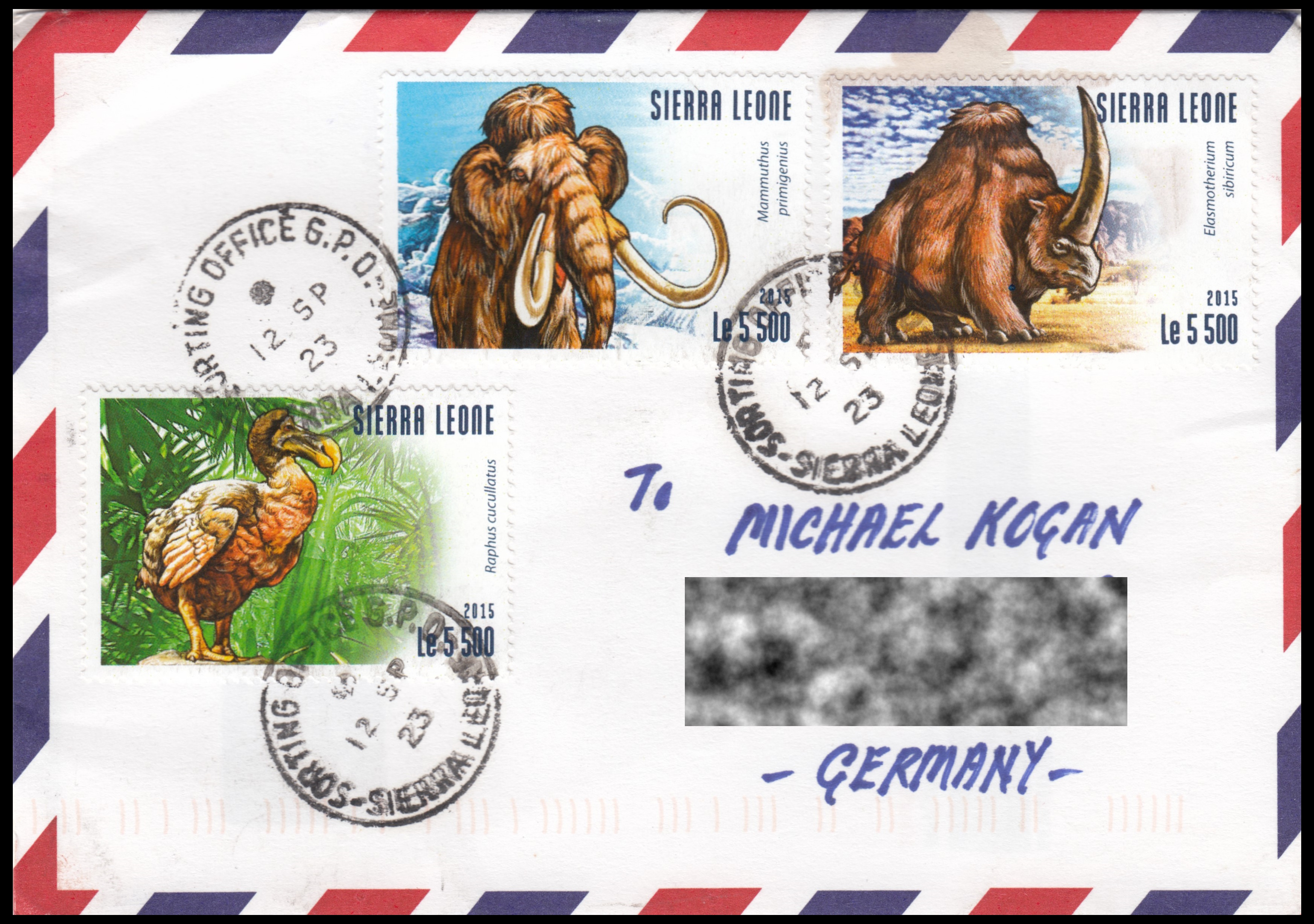 |
| Letter from Sierra Leone to Germany with stamps of Ice Age animals and Dodo bird. |
Many stamps issued by Sierra Leone between 1964 and 1971 were in fancy shapes. [R2]
Until the mid-1980’s, the country issued only a few dozen stamps per year.
Between 1985 and 1988 over 100 stamps were issued by Sierra Leone per year.
In 1990, the country became a client of IGPC Agency – this company produced several hundred stamp issues per year on behalf of Sierra Leone.
In 2000, almost 600 stamps were issued!
Most of these stamps have nothing to do with the country.
In 2014, IGPC Agency was replaced with Stamperija.
Stamperija has continued the trend of producing an extraordinary number of stamps on behalf of the country – reaching over 1200 stamp issues in 2017!
Official stamps of Sierra Leone related to Paleontology: fossils and reconstructions of dinosaurs and other prehistoric animals, Charles Darwin
| 08.06.1992 "Prehistoric animals" | 04.05.1995 "Prehistoric animals" | 18.08.1998 "Dinosaurs" [5] |
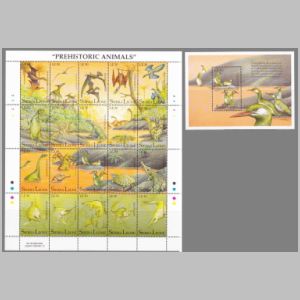 |
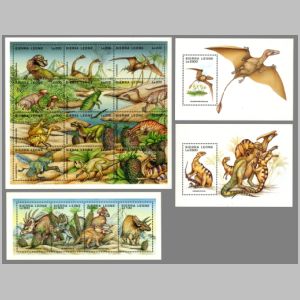 |
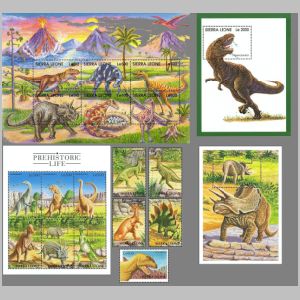 |
| 01.03.2001 "Dinosaurs" | 01.03.2001 "Dinosaurs" [4] | 10.05.2004 "Prehistoric animals" |
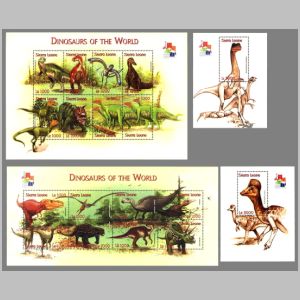 |
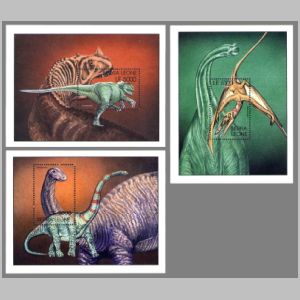 |
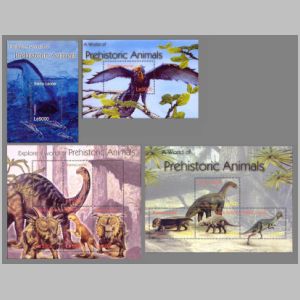 |
| 01.03.2010 "Charles Darwin" | 22.05.2015 "Fauna of West Africa" [1] | |
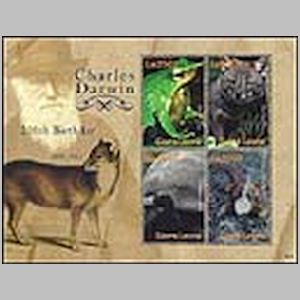 |
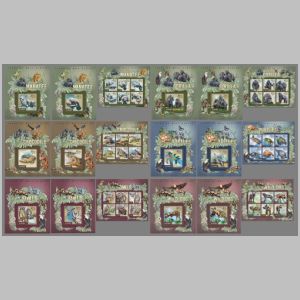 |
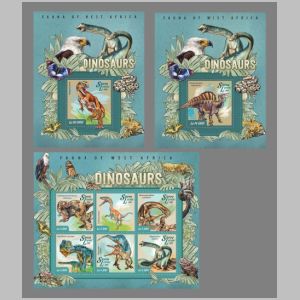 |
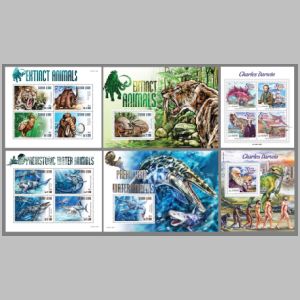 |
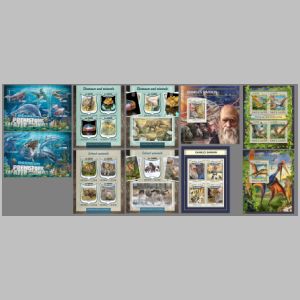 |
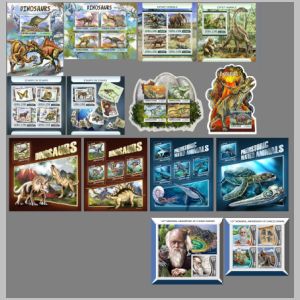 |
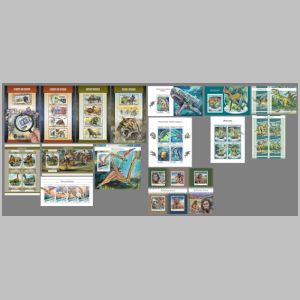 |
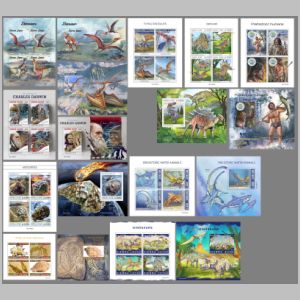 |
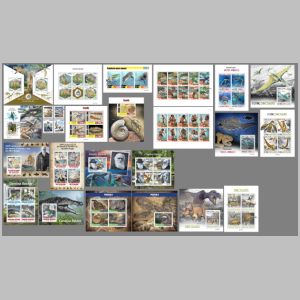 |
|
20.03.2023 "Fossils"
20.03.2023 "Dinosaurs" 20.03.2023 "Extinct species" 20.03.2023 "Flying dinosaurs" 20.03.2023 "Theory of Evolution" 25.05.2023 "165 years since Charles Darwin publishes his theory of evolution" 25.05.2023 "Elephants & Neanderthals" 25.05.2023 "Prehistoric water animals" 11.08.2023 "Extinct species" 15.12.2023 "“Prehistoric Humans" 15.12.2023 "Dinosaurs" 15.12.2023 "Prehistoric Amphibians" 15.12.2023 "Prehistoric water animals" 15.12.2023 "Extinct species" 15.12.2023 "Mammoths" 15.12.2023 "Flying dinosaurs" |
12.02.2024 "215th anniversary of Charles Darwin"
12.02.2024 "Dinosaurs" 12.02.2024 "Fauna of the Carboniferous Period" 12.02.2024 "Prehistoric water animals" 12.02.2024 "Prehistoric reptiles" 12.02.2024 "215th anniversary of Charles Darwin" 12.04.2024 "215th anniversary of Charles Darwin" 12.04.2024 "Dinosaurs" 25.06.2024 "Fossils" |
|
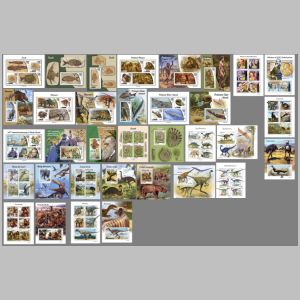 |
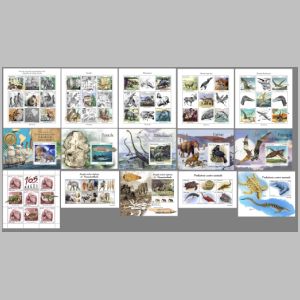 |
 |
Notes:
[1] In June 2015, Stamperija issued on behalf of Sierra Leone 19 stamp sets. These sets included 57 blocks and mini-sheets totaling 152 stamps on the subject of “Fauna of West Africa”.
For comparison, Germany which has a population 13 times greater than Sierra Leone, issued only 74 stamps in 2014.
One of these sets shows some dinosaurs, with modern animals decorating the margins of the sheet. On other sheets, dinosaurs are present in the margins of the sheets with stamps showing modern animals.
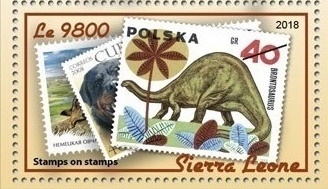
|
| Brontosaurus stamp of Poland 1965 on stamp of Sierra Leone 2018 |
[2] "Flying dinosaurs" is not the correct term to apply to the animals shown on these stamps. The animals pictured are pterosaurs.
Pterosaurs are a group of flying reptiles in the Archosauria. Reptiles in the archosaurs include crocodiles, dinosaurs, and pterosaurs.
[3] One of the stamps shows dinosaur (Apatosaurus/Brontosaurus) stamp of Poland 1965.
[4] According to Scott catalog, these stamps were not available in the market until 2002.
[5] This set is almost identical to set of Madagascar 1999:
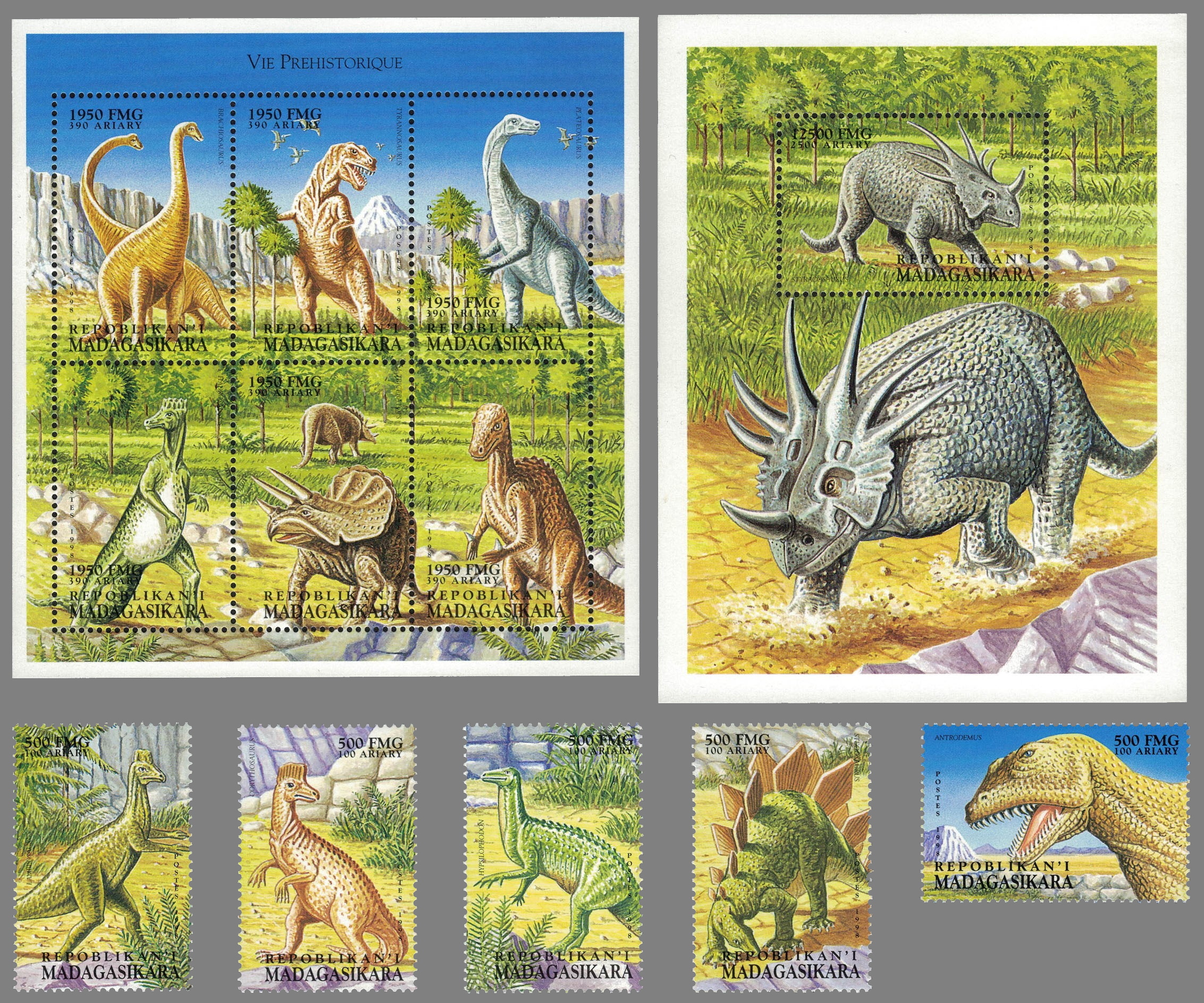
|
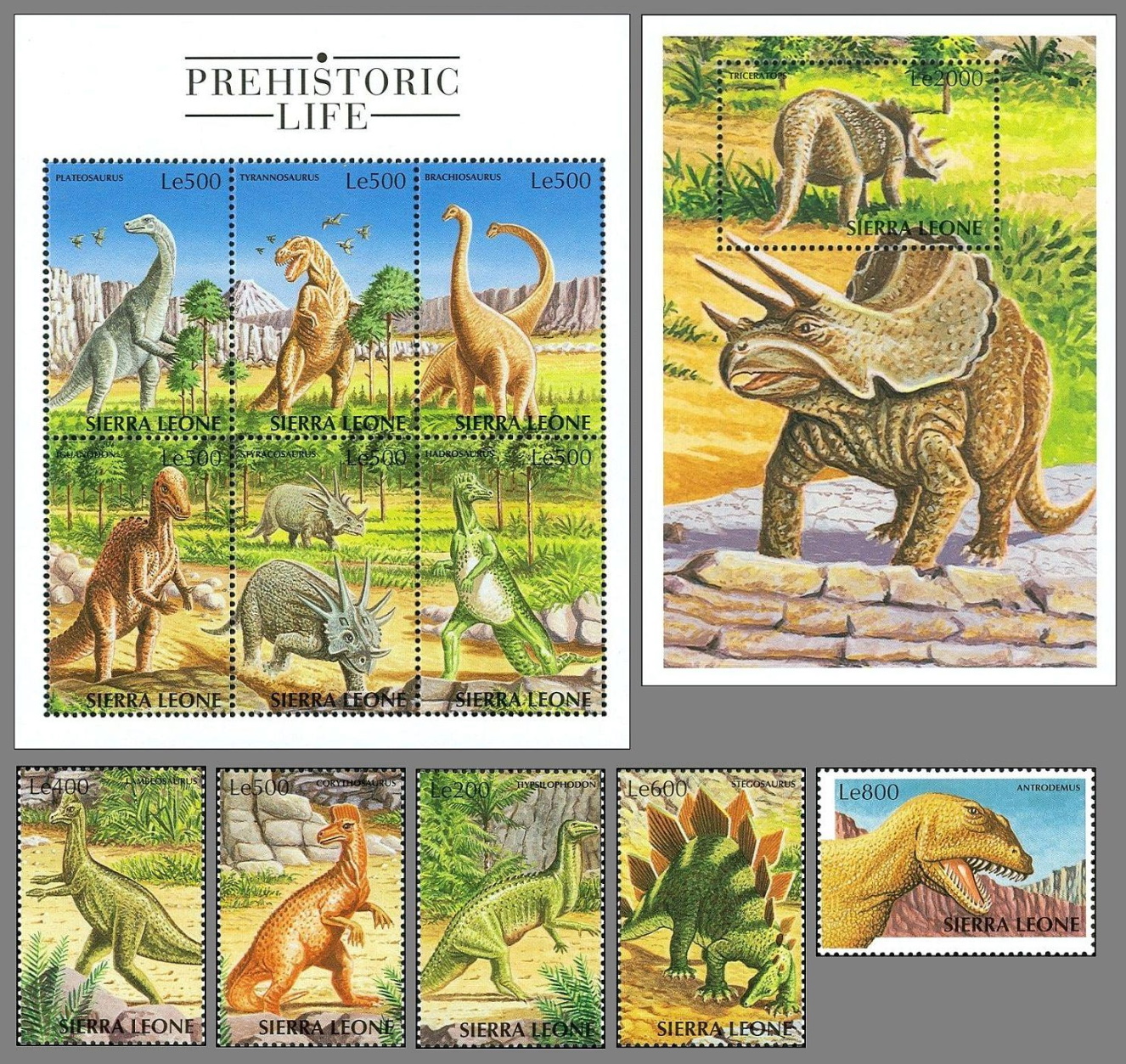
|
| Dinosaurs and other prehistoric animals on stamps of Madagascar 1999 MiNr.: 2301-2312, Bl. 306, Scott: 1435-1439, 1441a-f, 1442. | Dinosaurs and other prehistoric animals on stamps of Sierra Leonne 1998 MiNr.: 3006-3016, Bl. 386, Scott: 2108-2112, 2113a-f, 2116. |
Other stamps of Sierra Leone to consider
| 10.12.1982 "Centenary of death of Charles Darwin" [A1] | 29.04.2016 "Conrad Gessner" [A2] | 27.05.2016 "National parks of Africa: Uganda" [A3] |
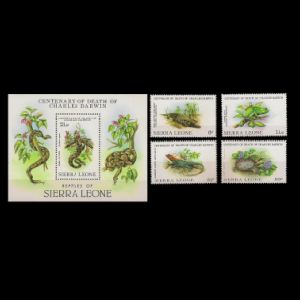 |
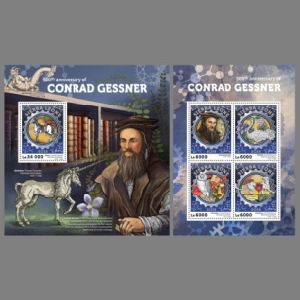 |
 |
| 30.11.2017"The greatest polar explorers" [A4] | 30.11.2018 "150th anniversary of Robert Falcon Scott" [A4] | 24.07.2020 "80th anniversary of the discovery of cave paintings in Lascaux, France" |
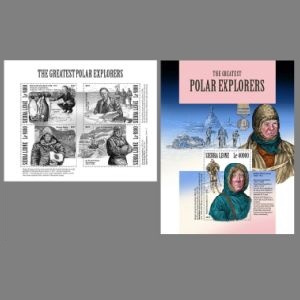 |
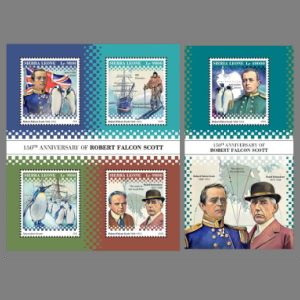 |
 |
Notes:
[A1] Set of 4 stamps and a block dedicated to "Centenary of death of Charles Darwin", unfortunately without any image of the great scientist.
[A2] Conrad Gessner was the first naturalist to write a book about fossils: "De omni rerum fossilium genere, gemmis, lapidibus, metallis, et huiusmod", published in 1565.
[A3] On May 27 2016, Stamperija issued 18 Mini Sheets for Sierra Leone with the common subject "National Parks".
Two of them shows East African Rift Valley, the Olduvai Gorge and the Turkana Lake on the map. All of these places are well-known for their fossils of prehistoric humans.
[A4] Robert Falcon Scott CVO (6 June 1868 – 29 March 1912) is shown on some stamps of the set.

|
| Robert Falcon Scott on stamps of Sierra Leone 2018 MiNr.: 10493, Scott: |
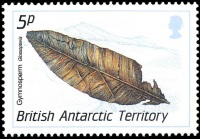
|
| Glossopteris on stamp British Antarctic Territory 1990 MiNr.: 160, Scott: 157 |
Scott and his companions died on the second expedition. When Scott and his party's bodies were discovered, 16kg of Glossopteris (an extinct beech-like tree from 250 million years old) fossils from the Queen Maud Mountains were found next to their bodies, which they had dragged on hand sledges.
These fossils were promised to Marie Stopes (shown on UK stamp in 2008) to provide evidence for Eduard Suess's idea that Antarctica had once been part of an ancient super-continent named Gondwanaland (now Gondwana).
More details are here.
Note: Robert Falcon Scott was honoured on several stamps of British Antarctic Territory and UK, as well as on several international postmarks. [R3]
Commemorative Postmarks of Sierra Leone related to Paleontology: dinosaurs
Legend is here| 08.06.1992 "Prehitoric animals" [FDC] | ||
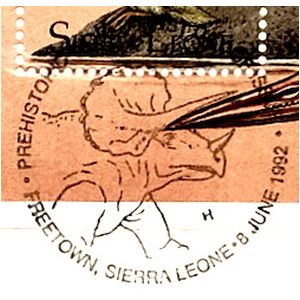 |
|
|
References:
- [R1] Sierra Leone:
Wikipedia,
WikiTravel,
Flag Counter
- [R2] Postal History and Philately of Sierra Leone:
Wikipedia,
LINN's Stamp News,
"In quest for abusive and undesirable stamp issues" by Jari Majander, published in Nr. 29
Links to official website of the Post Authority, stamp catalog and a list of new stamps of Sierra Leone are here. - [R3] Robert Falcon Scott: Wikipedia, Expeditions fieldmuseum, BBC.
- [R4] Conrad Gessner: Wikipedia,
Acknowledgement:
Many thanks to Dr. Peter Voice from Department of Geological and Environmental Sciences, Western Michigan University, for reviewing the draft page and his valuable comments.
| << previous country | back to index | next country >> |